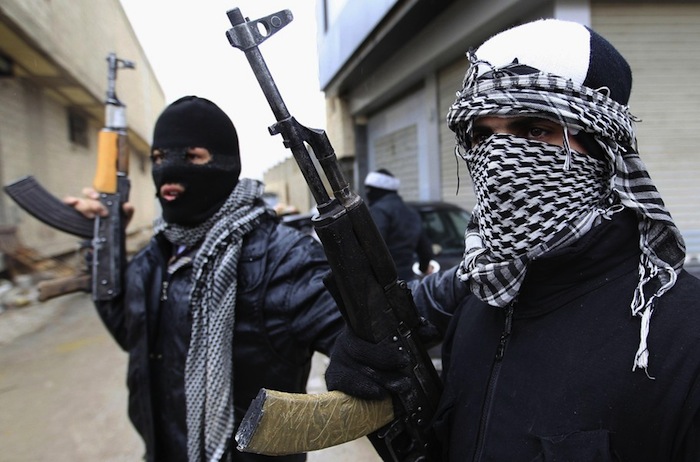

12/14/2014
Unlike the United States, which continues to admit potentially unfriendly Islamics willy-nilly, the government of Canada may go on a diet to cut down on Muslims. It would be a fine act of leadership on the side of sanity: not all Muslims are terrorists, but nearly all terrorists are Muslims, making them an unwise choice as immigrants.
It’s much more sensible, if rescue must be pursued, to welcome Christians, Jews and Yazidis who have been under attack by jihadists. Death by Islam has been a growing problem for the last 1400 years, where the totalitarian system has been “spread by the sword” over expanding territory.
One indication is that the majority of the current crop of refugees has been generated by Islam (see World Refugee Day: Jihad on the March).
It doesn’t help when the Obama administration has decreed that security standards for refugees be relaxed, thereby endangering us all.

Naturally, Canada’s liberal CBC media disapproves of Muslim-free refugee admittance:
Canada considers prioritizing religious minorities in Syria refugee resettlement, CBC News, December 12, 2014
The federal government is seeking to resettle more Syrian refugees, but only from the country’s religious minorities, according to sources close to discussions around Canada’s position on refugees from the war-torn nation.Canada has been struggling to meet an earlier commitment from July 2013 to resettle 1,300 Syrians by the end of this year.
Statistics tabled in the House of Commons last week showed 457 refugees had arrived as of mid-November.
On Tuesday, the government updated that number to 703. Kevin Menard, a spokesman for the immigration minister, wrote CBC News on Friday saying the numbers are “going up fairly quickly.”
Refugee advocacy organizations in Canada have been asking the government to take in 10,000 more Syrians over the next two years, and the UN says it is in dire need of assistance as the civil war intensifies.
Why no commitments in Geneva?
Canada, along with other Western nations, was urged to do more this week at a conference on Syrian refugees held in Geneva by the UN High Commissioner for Refugees.
CBC News has confirmed that the parliamentary secretary to the minister of immigration, Costas Menegakis, travelled to Geneva earlier this week. He held meetings but left without making any new commitment to the UN’s refugee agency.
Sources close to the discussions say Canada is seeking to resettle only refugees from Syria’s religious minorities, something that would likely be difficult for the UN’s refugee agency to accept.
The UNHCR’s policy on refugees says a resettlement state determines the “size and composition” of who and how many refugees it accepts, and “therefore has full control with respect to decisions on individual cases.”
“Nevertheless, UNHCR urges all states to be guided by the agency’s internationally recognized criteria on eligibility, global needs and priorities,” the policy says.
“To preserve the integrity of resettlement as a protection tool and durable solution for refugees most in need, it is important to ensure resettlement programmes are needs?based, non?discriminatory and achieve successful integration outcomes.”
Canada ‘a world leader’
In a written reply to questions from CBC News, Menard reiterated Canada’s commitment to help Syrians since the start of the crisis.
“We continue to work with international partners to ensure Canada remains a world leader in providing protection to the world’s most vulnerable populations,” he said in an email.
In the email, he did not respond to specific questions asking whether Canada is seeking to put restrictions on new Syrian refugees — limiting them to religious minorities.
Last week, at a news conference urging Canada to answer the call from the UN’s refugee agency with a generous response, the secretary general of Amnesty International Canada, Alex Neve, questioned Canada’s commitment.
“There are many who have raised the concern that if this was not a large population of Muslim refugees, would we be seeing a different response,” Neve said. “I do not want to believe that that is all at the heart of why we’re seeing such a miserly response from Canada. But because there is no other explanation right now that hangs there.”
Menegakis rejected the suggestion by Neve.
“We totally reject that comment. It is ridiculous and I am not going to dignify it by discussing it any further,” Menegakis told CBC News.
‘Categorically false’
In Friday’s question period, both opposition parties asked whether the religion of refugees was a factor in Canada’s approval process.
“To suggest that we are only going to focus on the one group of people is categorically false,” Menegakis said. “We have seen countless examples in recent years of people being persecuted for their religious beliefs. We will prioritize persecuted ethnic and religious minorities … those at demonstrated risk, and we will make no apologies for that.”
In an interview airing Friday on CBC News Network’s Power & Politics, Liberal immigration critic John McCallum said he wrote a letter to the ambassador of religious freedoms asking him to intervene on behalf of Syrian refugees.
“The government’s decision to discriminate against refugees who practise certain religions violates basic Canadian values and is simply unacceptable,” McCallum said in a letter to Andrew Bennett obtained by CBC News.
“I urge your office to intervene on behalf of the Syrian refugees who are being killed and terrorized because of their religion,” the letter said.
The Canadian Council for Refugees said in a news release Friday it reacted with “shock” to the report.
“If true, this would be outrageous,” said Loly Rico, the group’s president. “It is completely unacceptable and in fact irresponsible to discriminate against refugees on the basis of religion.”
“Refugees must be selected for resettlement according to need.”
Immigration Minister Chris Alexander said in the summer that he expected to make an announcement about a commitment to take in further Syrian refugees in the near future.